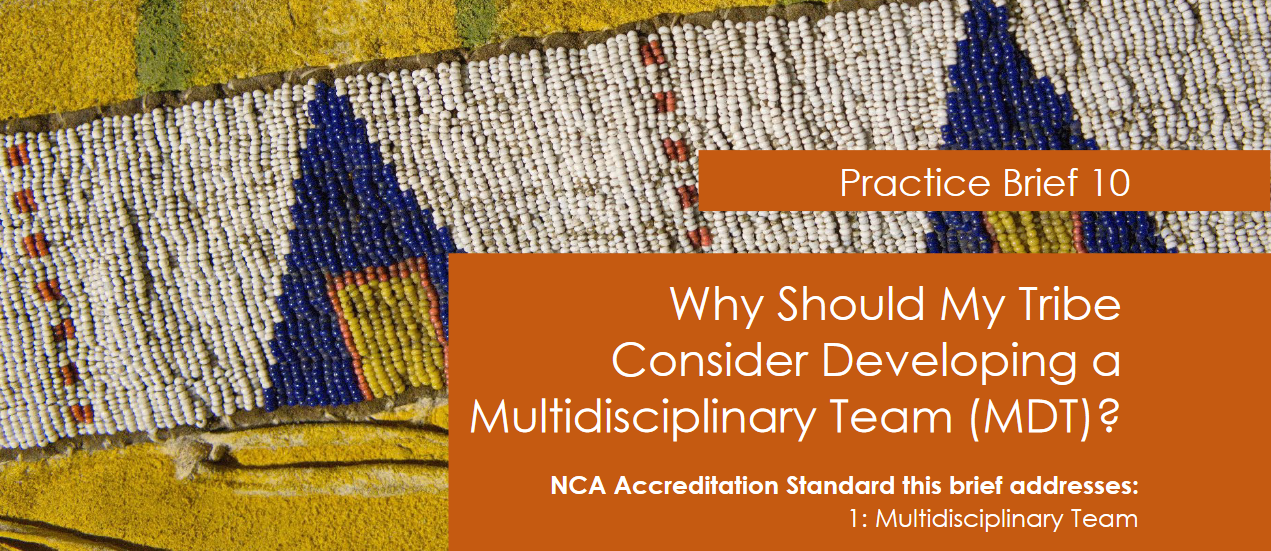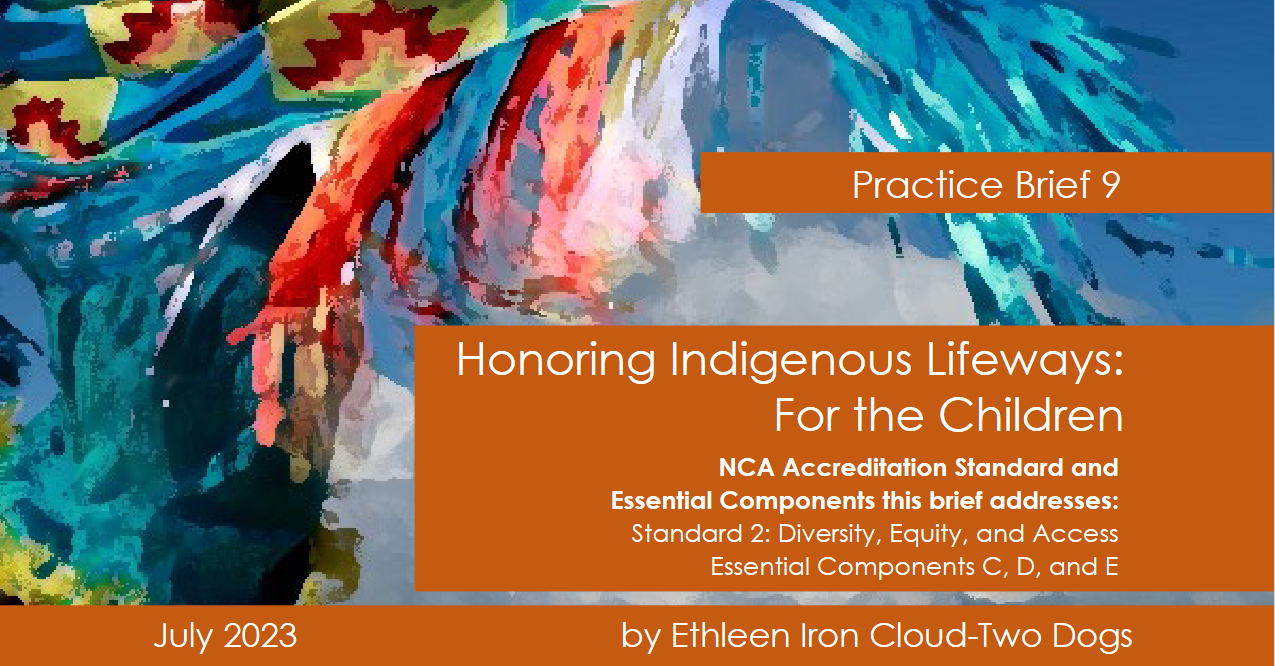
Practice briefs
Practice-based guidance from NCARC
Practice Brief 20: Words of Wisdom from Tribal CAC Directors. NCARC staff reached out to the Directors of six NCA accredited CACs operated by Native Nations. We asked the Directors questions that we thought might be of interest to others who are interested in developing accredited CACs in their communities. This Practice Brief shares their reflections and insights.
Practice Brief 19: Mental Health Services for Caregivers
In this Practice Brief, we offer guidance on how CACs can support the mental-health needs of non-offending parents, including: information on evidence-supported conjoint treatments; tools to identify mental health concerns; and considerations for working with Indigenous families.
Practice Brief 18: Always Ready to Help: An Interview with Salli Kerr, WRCAC Training Specialist & Tribal Liaison
In this Practice Brief, we sit down with Salli Kerr to discuss the operations of a regional CAC and the unique characteristics of the Western Region.
Practice Brief 17: Evidence-Supported, Culturally Responsive Mental Health Care for Native Children and Families in the CAC Setting
In this Practice Brief, we explain what it means to meet the NCA Mental Health standard as well offer considerations for implementing treatment models with Native American children and families.
Practice Brief 16: Every Bit of it is Relational: An Interview with Carrie Little
For this Practice Brief, NCARC sat down with Carrie Little, the Executive Director of the Children’s Advocacy Centers of Oklahoma, to learn how state CAC chapters can serve and support emerging and existing CACs.
Practice Brief 15: Honoring our Ancestors: An Interview with Gina South
In this Practice Brief, Gina South, a Tribal Prosecutor for the Choctaw Nation of Oklahoma, discusses how her Tribe was able to develop an accredited CAC, emphasizing the importance of engaging Tribal leadership, establishing Tribal Code, and drawing on the strengths of her community.
Practice Brief 14: Budgeting for a Tribal CAC
This practice brief provides initial budgeting guidance for Tribal stakeholders interested in developing a new CAC.
Practice Brief 13: Multidisciplinary Teams and Child Protection Teams
This practice brief outlines commonalities and distinctions between Child Protection Teams (common in many Tribal communities) and Multidisciplinary Teams as defined by the National Children’s Alliance.
Practice Brief 12: Relationships as the Key to Effective Tribal CAC Management
In this practice brief, Tulalip Tribes’ CAC Director Jade Carela discusses how to foster relationship building across agencies and among Tribal and non-Tribal CAC staff and MDT members to ensure effective teamwork and protection for Tribal victims and survivors.
Practice Brief 11: Funding for Tribal Child Advocacy Centers
This practice brief provides guidance about how to pursue funding for CAC development and sustainability, including an overview of federal and other funding sources that might be a good fit for Tribal communities.
Practice Brief 10: Why Should My Tribe Consider Developing a Multidisciplinary Team?
In this practice brief, which we encourage Tribal stakeholders to use as an informational resource in local communities, NCARC explains what a Multidisciplinary Team (MDT) is and how Tribal ownership of the MDT response can make a difference in outcomes for children and families.
Practice Brief 9: Honoring Indigenous Lifeways
In this practice brief, NCARC’s Ethleen Iron Cloud-Two Dogs discusses Oglala Lakota ceremonies that promote child safety, well-being, and cultural connection, encouraging reflection on how CACs might incorporate cultural supports to improve outcomes for children and families.
Practice Brief 8: Creating a Welcoming CAC Environment for Native Children and Families
In this practice brief, NCARC’s Maegan Rides At The Door and Lalania Walker of the White Earth Nation’s CAC discuss customizing CAC facilities with Tribally specific imagery and visual art to support psychological safety and cultural connectedness among clients and families.
Practice Brief 7: An Interview with NCARC’s Deanna Chancellor on the Effectiveness and Flexibility of the CAC Model
In this practice brief, NCARC’s Deanna Chancellor discusses her background as a CAC Director and her belief in the ability of the CAC model to meet the needs of Tribal children.
Practice Brief 6: Jurisdiction, Tribal Service Systems, and CACs
This practice brief explains issues related to criminal jurisdiction and unique Tribal human service systems that affect CAC services and operations, offering guidance in how to navigate complexities that may arise.
Practice Brief 5: MOUs and Authentic Partnership
This practice brief discusses the significance of tailoring MOUs to the individual Tribes that CACs partner with, the prevalence of CACs’ use of MOUs with Tribes, and best practices for CAC development of MOUs with Tribes.
Practice Brief 4: Tribal Sovereignty and the CAC Model
This practice brief provides an overview of the importance of Tribal sovereignty in child and family services, with considerations for how this might affect child advocacy professionals.
Practice Brief 3: Tribal Children and Forced Assimilation
This practice brief provides an overview of the history of the forced assimilation of Tribal children as it affects the CAC movement, spanning the Boarding School Era, the Adoption Era, and the present-day realities of child welfare disproportionalities.
Practice Brief 2: Culturally Responsive Services
This practice brief provides context about the fraught histories between tribal communities and outside agencies/providers, offering strategies for providing culturally responsive direct services to tribal children and families.
Developed by NCARC and the Alaska Children’s Alliance, this practice brief provides guidance for non-Native child advocates seeking to enhance their services to AI/AN children and families, focusing on cultural and historical issues that affect present-day relationship building in tribal communities.
Practice-based guidance from NCARC
Practice Brief 17: Evidence-Supported, Culturally-Responsive Mental Health Care for Native Children and Families in the CAC Setting
Practice Brief 16: Every Bit of it is Relational: An Interview with Carrie Little
For this Practice Brief, NCARC sat down with Carrie Little, the Executive Director of the Children’s Advocacy Centers of Oklahoma, to learn how state CAC chapters can serve and support emerging and existing CACs.
Practice Brief 15: Honoring our Ancestors: An Interview with Gina South
In this Practice Brief, Gina South, a Tribal Prosecutor for the Choctaw Nation of Oklahoma, discusses how her Tribe was able to develop an accredited CAC, emphasizing the importance of engaging Tribal leadership, establishing Tribal Code, and drawing on the strengths of her community.
Practice Brief 14: Budgeting for a Tribal CAC
This practice brief provides initial budgeting guidance for Tribal stakeholders interested in developing a new CAC.
Practice Brief 13: Multidisciplinary Teams and Child Protection Teams
This practice brief outlines commonalities and distinctions between Child Protection Teams (common in many Tribal communities) and Multidisciplinary Teams as defined by the National Children’s Alliance.
Practice Brief 12: Relationships as the Key to Effective Tribal CAC Management
In this practice brief, Tulalip Tribes’ CAC Director Jade Carela discusses how to foster relationship building across agencies and among Tribal and non-Tribal CAC staff and MDT members to ensure effective teamwork and protection for Tribal victims and survivors.
Practice Brief 11: Funding for Tribal Child Advocacy Centers
This practice brief provides guidance about how to pursue funding for CAC development and sustainability, including an overview of federal and other funding sources that might be a good fit for Tribal communities.
Practice Brief 10: Why Should My Tribe Consider Developing a Multidisciplinary Team?
In this practice brief, which we encourage Tribal stakeholders to use as an informational resource in local communities, NCARC explains what a Multidisciplinary Team (MDT) is and how Tribal ownership of the MDT response can make a difference in outcomes for children and families.
Practice Brief 9: Honoring Indigenous Lifeways
In this practice brief, NCARC’s Ethleen Iron Cloud-Two Dogs discusses Oglala Lakota ceremonies that promote child safety, well-being, and cultural connection, encouraging reflection on how CACs might incorporate cultural supports to improve outcomes for children and families.
Practice Brief 8: Creating a Welcoming CAC Environment for Native Children and Families
In this practice brief, NCARC’s Maegan Rides At The Door and Lalania Walker of the White Earth Nation’s CAC discuss customizing CAC facilities with Tribally specific imagery and visual art to support psychological safety and cultural connectedness among clients and families.
Practice Brief 7: An Interview with NCARC’s Deanna Chancellor on the Effectiveness and Flexibility of the CAC Model
In this practice brief, NCARC’s Deanna Chancellor discusses her background as a CAC Director and her belief in the ability of the CAC model to meet the needs of Tribal children.
Practice Brief 6: Jurisdiction, Tribal Service Systems, and CACs
This practice brief explains issues related to criminal jurisdiction and unique Tribal human service systems that affect CAC services and operations, offering guidance in how to navigate complexities that may arise.
Practice Brief 5: MOUs and Authentic Partnership
This practice brief discusses the significance of tailoring MOUs to the individual Tribes that CACs partner with, the prevalence of CACs’ use of MOUs with Tribes, and best practices for CAC development of MOUs with Tribes.
Practice Brief 4: Tribal Sovereignty and the CAC Model
This practice brief provides an overview of the importance of Tribal sovereignty in child and family services, with considerations for how this might affect child advocacy professionals.
Practice Brief 3: Tribal Children and Forced Assimilation
This practice brief provides an overview of the history of the forced assimilation of Tribal children as it affects the CAC movement, spanning the Boarding School Era, the Adoption Era, and the present-day realities of child welfare disproportionalities.
Practice Brief 2: Culturally Responsive Services
This practice brief provides context about the fraught histories between tribal communities and outside agencies/providers, offering strategies for providing culturally responsive direct services to tribal children and families.
Developed by NCARC and the Alaska Children’s Alliance, this practice brief provides guidance for non-Native child advocates seeking to enhance their services to AI/AN children and families, focusing on cultural and historical issues that affect present-day relationship building in tribal communities.




















